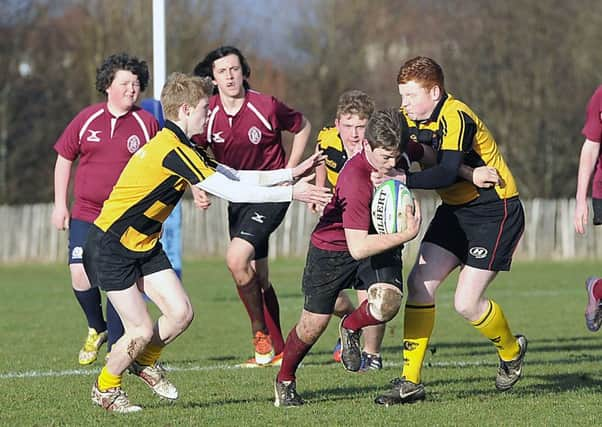Call for schools to ban '˜harmful contact' in rugby games


Tackles and scrums should be prohibited on school playing fields, according to Allyson Pollock and Graham Kirkwood of the Institute of Health at Newcastle University.
But their conclusion has been rejected by a former Scotland rugby internationalist, who says the move would take safety measures too far. Allan Jacobsen, who played 65 times for Scotland, said removing contact altogether would “change the sport completely”.
Advertisement
Hide AdAdvertisement
Hide AdWriting in the British Medical Journal (BMJ), the academics said that most injuries in youth rugby occur due to the collision elements of the game. Removing collision from school rugby is likely to “reduce and mitigate the risk of injury” in pupils, they said.
They argue that a history of concussion is associated with the “lowering of a person’s life chances” across a number of measures including low educational achievement and premature death.
Meanwhile, a head injury is linked to an increased risk of dementia, they added. Citing previous research into sports injuries in youngsters, the pair argue that rugby, along with ice hockey and American football, have the highest concussion rates.
They said that rule changes in collision sports can “make a difference”, highlighting the Canadian ban on “body checking” – where a player deliberately makes contact with an opposing player – in ice hockey for under 13-year-olds.
Advertisement
Hide AdAdvertisement
Hide AdThe evidence for other strategies to reduce concussion risk in contact sport – such as mouth guards – is “weak”, the article adds.
And in the UK “teacher training in the skills of rugby are lacking, as is concussion awareness training,” the pair wrote.
The researchers called for “harmful contact” from the game at school level. In 2016, the nation’s most senior medics rejected a call for a ban on tackling in youth rugby. But Prof Pollock, who has been researching injuries and rugby injuries for more than ten years, and senior research associate Mr Kirkwood said that under United Nations conventions, governments have a “duty to protect children from risks of injury”.
However, former front row forward Jacobsen said he enjoyed the contact element of the sport at schoolboy level.
Advertisement
Hide AdAdvertisement
Hide AdHe added: “I certainly wouldn’t have got as much out of the game at a young age if the contact side of it had been removed.
“Obviously, making the game safer is hugely important and we want kids to enjoy the game in a safe way, but I got far more out of rugby than I got injuries and I think it would be a shame to see contact removed altogether.”
Commenting on the article, Professor Tara Spires-Jones, UK Dementia Research Institute programme lead and deputy director of the Centre for Discovery Brain Sciences at the University of Edinburgh, said: “Very strong, reproducible evidence supports a greater risk of dementia in people who have head injuries in their lifetimes, which urges caution in games where there is a significant risk of head injury.
“However, the data on specifically whether playing rugby or other contact sports in school increases your risk of dementia are not as robust yet due to a lack of large prospective studies.